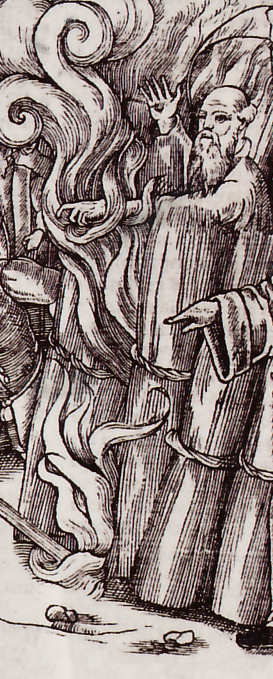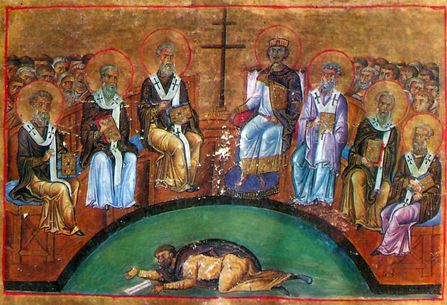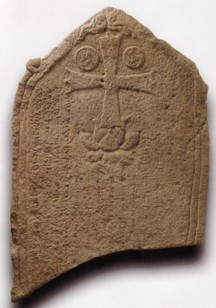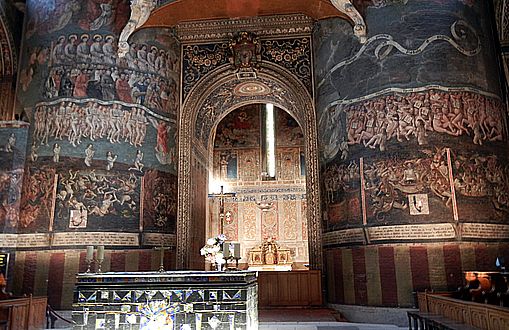Text created: 2007-02-15,
File last modified:
Christian Documents Index
Major Christian Heresies
An Overview for College Students
(in historical order)
Background: There are certain elements of Christian theology so difficult to understand that the only way for different people to give the appearance of agreeing about them is to use exactly the same words. Conspicuous among such elements is the doctrine of the trinity.
The need for a clear and unified statement of Christian belief was the problem addressed at the First Ecumenical Council at Nicaea in AD 325, which articulated such a doctrinal statement: the Nicene Creed. Subsequent Church councils sought to clarify it further.
 Heretics Burning
Heretics Burning
Church councils, by accepting certain positions as orthodox, provide historians the useful term "proto-orthodox" to refer to those positions before their general or official acceptance. With conciliar acceptance, proto-orthodox views formally became orthodox (for those accepting the authority of the council), and all conflicting ones became "heterodox."
Heterodox views, when persistently held and actively offensive to holders of orthodox views, are "heresies" (or "heresy" if taken collectively), even when they originated before the formal differentiation of orthodoxy. (All three terms —orthodoxy, heterodoxy, and heresy— are widely extended beyond discussions of Christianity.)
There has probably never been a Christian whom some other Christian at some period would not have considered a heretic, and there is probably no Christian alive today who would not have been viewed as a heretic by the majority of participants at some of the historical Church councils.
But truly famous "heresies" have arisen when believers in various periods have proclaimed heterodox views so persuasively that they gained enough followers for the organized church to consider them a problem. The challenge of combatting these positions focused a great deal of attention on exactly what they argued and precisely why it was incompatible with established doctrine.
For purposes of this page, I have tried to state a number of historically important heretical positions as starkly as possible, together with a very brief indication of the "error" underlying each one. All of the heresies listed here, obviously, were originally expounded in far subtler (and wordier) form, as were the attacks on them. The summaries here are merely thumbnail sketches.
Quick Links:
Marcionism,
Gnosticism,
Manichaeism,
Arianism,
Pelagianism,
Nestorianism,
Monophysitism & Monothelitism,
Averroism,
Albigensianism,
Waldensianism,
Arminianism,
Jordanianism
- Marcionism (IInd Century)
(named after Marcion, 85-160)
- The wrathful and war-like God of the Old Testament is a different god from the just and forgiving God of the New Testament, who, on discovering human suffering, appeared as Jesus Christ to bring salvation; the Old Testament is irrelevant; in the New Testament only parts of Luke and parts of the Pauline letters are authentic.
- This is heretical in part because:
(1) It denies the unity of God.
(2) It misunderstands the humanity of Christ.
(3) It rejects accepted scriptures.
- Comment: The contrast between the image of God presented by the Old Testament and the one laid out in the New Testament is obvious enough to most readers. However, Marcion rejected all scriptures except the book of Luke and the letters of Paul, to whom he considered himself an intellectual successor. He was excommunicated as few as four years after his conversion to Christianity. Rejecting nearly all forms of Christianity but his own, Marcion attracted a sufficient following to cause concern among more mainstream Christians, and his lasting influence on many Christian communities was probably one of the influences that led to the establishment of the Nicene Creed (AD 325).
- Gnosticism (IInd Century)
(named for Greek gnosis γνῶσις, "knowledge")
- Our world was created not by the true God, but by a lesser one —the "demiurge" (δημιουργός = "people's worker" = skilled craftsman), a kind of divine artisan— whose creation of the mundane world was essentially something of a mistake. Humans have a spark of divinity, however. The realm of the true God is concealed from humans, but there is secret knowledge which can enable some human souls to return to it. The knowledge was secretly transmitted by Jesus to the select few. Public rituals, unfortunately, have little utility.
- This is heretical in part because:
(1) God created everything, including people. There was no "demiurge." (2) Jesus did not transmit any secret knowledge. The means for full salvation are freely available from the public teachings and openly performed sacraments of the Church.
- Manichaeism (IIIrd century)
(named after Mani, ca. 216-276)
- The world is caught in a conflict between the forces of good and evil, led by two gods, a conflict which has existed since the beginning of time.
- This is heretical in part because:
(1) It postulates more than one god. (2) In the beginning there was only God. Evil therefore could have entered the world only afterward.
- Comment: Mani was a Persian or Mesopotamian. Although Manichaeism sometimes borrowed Christian elements (as well as Zoroastrian, Hebrew, and even eventually Buddhist elements), Manichaeism was not really a Christian sect, and its doctrines therefore should be classed as paganism rather than heresy. But it was an important force in the third and forth centuries (when it was usually illegal), and competed with Christianity, with which some people tried to combine it.
- Arianism (IVth century)
(named after Arius, 256-336)
- Jesus was different from God and secondary to him.
- Condemned at the Second Ecumenical Council (Constantinople, 381)
-

Arius, not yet officially a heretic, kneels before Constantine and the bishops at the First Council of Nicaea. (Miniature from the martyrology of Emperor Basil II, Vatican Library)
This is heretical in part because:
Christ was wholly divine, as well as wholly human, and, being wholly divine, could in no way be secondary to God the Father.
- Comment: Although Arianism was originally propounded with the simultaneous view that Jesus' nature was nevertheless still divine, the term is also extended, confusingly, to a wider range of views, including the view that Jesus was an ordinary person. Although condemned by the Church in the fourth century, the belief continues to reinvent itself today among liberal Christians. The non-divinity of Jesus is, of course, also a view held by most non-Christians.
- Comment: Arianism is historically one of the most important of the great heresies because it was especially widespread, as was opposition to it. The bitter conflict (personified in Arius and his enemy St. Athanasius) was important in inspiring Emperor Constantine to intervene by calling the Council of Nicene (Nicaea) in 325, which developed the Nicaean Creed, encapsulating the orthodox doctrine of the trinity.
-
Pelagianism (Vth century)
(named after Pelagius, ca 354 or 360 - ca 420 or ca 440 )
- The sin of Adam affected only Adam, not all humanity. Every individual is born innocent, but is free to choose to perform good or evil deeds. Thus choosing to behave virtuously will earn one spiritual salvation. Augustine errs in understanding that God's foreknowledge of all things means that human acts are predestined, since that undermines free will and the virtue of moral behavior. We are saved or condemned by our own choices, not by choices made by Adam.
- This is heretical in part because:
(1) People are saved ONLY by God's grace through their faith in Christ, not by the works they perform, which may have many motivations, including bad ones.
(2) It is illogical so speak of complete free will, since even free will is a gift of God, and therefore contingent upon God's agency.
(3) Pelagianism denies the contamination of all humans by original sin and allows for the possibility of sinless humans without the need of salvation through Christ, or of sinful humans able to gain merit on their own without reference to Christ.
- Comment: Pelagianism was a particular target for St. Augustine (354-430), one of the most important formulators of Christian theology. Pelagius was condemned as a heretic in 418, apparently in part due to Augustine's denunciation of him. Arguably it was his effort to argue against Pelagianism that led Augustine to refine his doctrine of the absolute necessity of divine grace in human salvation
- Comment: Variants of his position became widespread in modern Christianity under the name "semi-Pelagianism" (in contrast to predestinationism). Today most vernacular Christianity holds that freely performed good deeds improve one's chances of salvation. (See Arminianism, below.)
- Nestorianism (Vth century)
(named after Nestorius, ca 386 – ca 451)
- Christ had two natures, human (Jesus) and divine (Christ), quite distinct from each other, but united in the historical Jesus Christ. (Thus Mary was the mother of Jesus, his human nature, but was not the "Mother of God," since God was his divine nature.)

Early XIVth-Century Nestorian Gravestone from Inner Mongolia
- Condemned at the Third Ecumenical Council (Ephesus, 431)
- This is heretical in part because:
Christ was both wholly human and wholly divine, and these two natures were united in a single entity: the Christ. To speak of them being distinct implies that he was not wholly either of them. The title "Mary, Mother of God" is a constant reminder of the error of the Nestorian formulation.
- Comment: Nestorius was excommunicated in 431. His followers, hounded into exile, became the “Nestorian Church” and expanded eastward along trade routes. The movement became the first Christian church in China.
- Monophysitism (Vth century)
- Christ had a single, divine nature, not separate human and divine natures.
- Condemned at the Fourth Ecumenical Council (Chalcedon, 451).
Condemned again at the Third Council of Constantinople (680).
- This is heretical in part because:
Christ was both wholly human and therefore suffered as we suffer, and also wholly divine, and therefore able to forgive sins and redeem humans. To argue that he has only a divine nature is to deny that he had a human nature able to suffer as a human suffers.
- Comment 1:Once Monophysitism was declared heretical, a compomise was attempted to bring the powerful Monophysite heretics back into the fold, and a compromise doctrine called Monothelitism was proposed —see next entry— especially by Heraclius, about 638.
- Comment 2: Although Monophysitism has been reinvented constantly throughout the history of Christianity, it is often especially associated with Cyril of Alexandria (ca 376 - 444), and enjoyed greatest popularity in the churches of Syria, Palestine, Ethiopia, and especially Egypt, where it continued long after it was officially condemned.
- Monothelitism (VIIth century)
- Christ, although having separate human and divine natures, united in a single entity, nevertheless had only one will (thelēma) and only one operation (energeia).
- Condemned at the Third Council of Constantinople (680).
- This is heretical in part because:
The will is a property of the nature, so because Christ has two natures united in a single entity, he must have two wills (although the human will always conforms to the divine will).
- Comment: Monothelitism is not the same as Monophysitism, but rather an unsuccessful attempt to preserve the thrust of the Monophysite insight while attempting to avoid being heretical. See previous entry.
- Averroism (named after Averroës [Ibn Rushd], 1126-1198)
- A person's soul has an individual part and a divine part. The individual part is not eternal. The divine part is eternal, but it is not individual; instead it is shared with all people.
- This is heretical in part because:
It precludes the immortality of the individual and the resurrection of the dead.
-
Albigensianism (XIIth century)
(named after the town of Albi, France)

The Cathedral of Albi even today is dominated by murals depicting the differing fates of the saved and the damned, the good and the evil.
The world is caught in a conflict between the two gods of good and evil. The earth was created by Satan, the evil god, and through Jesus humans may be saved and brought to the realm of the true God.- This is heretical in part because:
The world was created by God, not by Satan.
- Comment: The name Cathars is also used, since Albigensian believers so styled themselves (from Greek katharoi καθαροί, "pure [ones]"). Because of the similarity of this XIIIth-century position to earlier Manichaeism, it was also often called Manichaeism by writers of the period. (See above, Manichaeism.)
- Waldensianism (XIIIth Century)
(named after Peter Waldo, d. 1205 or 1217)
- Concern with money and power leads to spiritual corruption; even Church officials should not seek a sumptuous style of life.
- This is heretical in part because:
Spirituality is a function of one's relationship with God, not with material things.
- Comment: Persecution of the Walensians (or Waldenses) was probably motivated largely by this message being an embarrassing nuisance rather than by its being strictly heretical. Furthermore, the Church argued that the laity had no right to preach, which is what Waldo's followers were doing, providing a less embarrassing reason for opposing them. Waldensianism seems to have deviated further after adherents were excommunicated, when they had little further motivation to toe any church line and when they saw church wealth as even more sinful.
-
Arminianism (XVIth-XVIIth Centuries)
(named after Jakob Arminius, 1560-1609)
- It is un-Biblical to argue, as did Calvin (1509-0564), that some people are predestined to be saved and others not; Christ died to provide a chance of salvation to everyone.
- This is heretical in part because:
Since God has perfect knowledge, he knows in advance who will be saved and who not. What is known in advance is not logically available for modification.
- Comment: Offering the possibility of salvation to everyone, Arminianism had wide appeal, almost certainly wider than predestinationism, and influenced John Wesley and the Methodist churches derived from Wesley's views. The word "Arminianism" arises most often when it is contrasted with Calvin's predestinationism. Some variant of the rejection of predestination is found among most Christians today, who are, in that respect, mostly Arminians. (See Pelagianism, above.)
- Comment: It is very likely a logical fallacy that foreknowledge is the same as predestination. This is a problem that has troubled Western philosophy since Classical Greek times.
- Jordanianism (XXth-XXIst Centuries)
(named after me)
- People are a lot sillier than they think they are, and discussing theology does not, in itself, save them from that trait.
- This is heretical in part because:
It fails to take the silly bits seriously and it ignores the saving grace of fatuous pomposity and vaulting self-confidence.
You can take a cool multiple-choice quiz over these if you click here, but you can avoid the quiz if you don't. For a whole masochistic load of Christianity quizzes, click here.
Return to top.
This page has received

visits since 161101.




